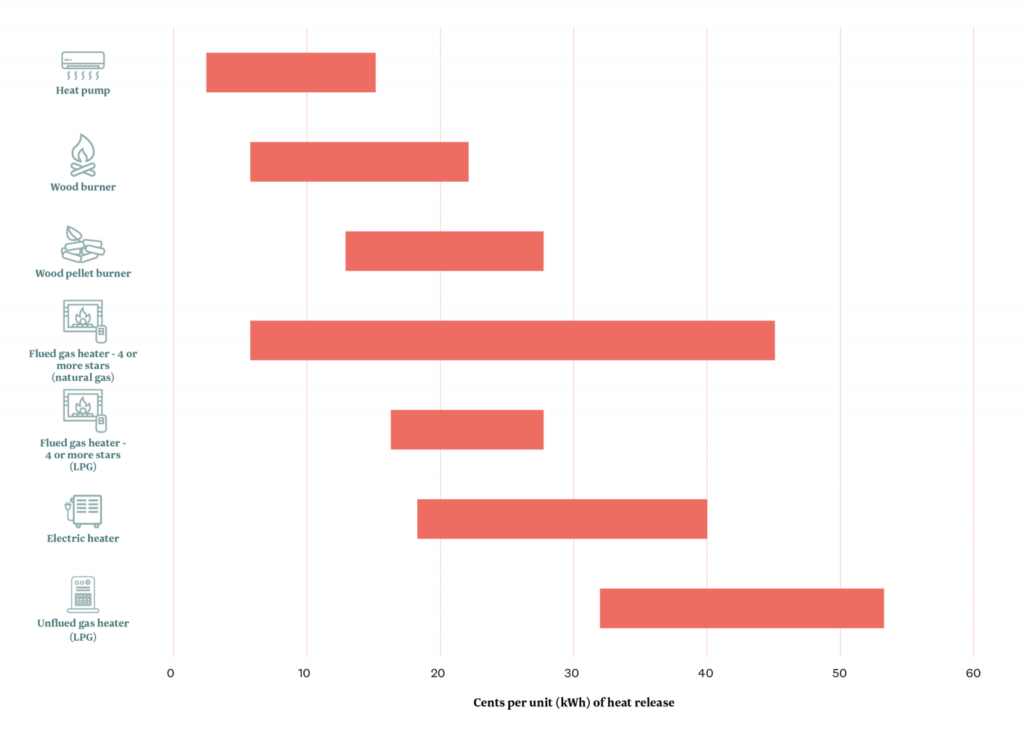These are the most common types of heating in Dunedin flats:
If you only take one thing away from this breakdown, it should be that heat pumps cost way less than you think. One hour of heat pump costs LESS than an extra 10-minute shower. Don’t be stingy with heating your flat, and make sure you keep healthy! A warm flat means a dry flat, and that’s better (and healthier) for everyone!
Heat pump:
This is the most popular and efficient option. These devices absorb the heat from outside and transfer it inside. They move heat around as opposed to actually generating it which is why it is one of the most efficient heat sources. Heat pumps are great for living areas as they heat up a large space quickly whilst requiring less energy to do so than other heaters.
Electric heaters:
Although electric heaters can be bought for a low initial cost, they’re very costly to run! It is very important to keep yourself warm in the colder months of Dunedin, and these bad boys are a great heat top up for your room, but just be mindful to turn them off whenever you don’t need them on.
Woodfire:
Although a fireplace may seem like the cheapest option when heating a flat, firewood can be expensive! The average cost of firewood for a winter is around $700. You also need to consider the effort that goes into having a fireplace: chopping up the wood, having a dry place to store it, potentially hiring a trailer to pick it up, the set up each time you want to use it… and it does take a wee bit longer for a room to heat up compared to a heat pump. If you do have a fireplace make sure you have carefully planned out how much firewood you will actually need as you don’t want to get stuck in those colder months and not be able to find any dry wood. If you do have a fireplace, make sure to purchase your wood in summer when it’s dry, has a few months to dry out even more, and is cheaper!

TIPS!
Keep your home dry
The more moisture that is in your home, the harder it is to heat it up! Therefore, one of the best ways to heat up a cold Dunedin flat is to keep it as dry as possible. A few simple ways to do this are having quick showers, using your extractor fan when cooking, drying your clothes outside (not inside!), and getting as much fresh air and sun into your flat as possible. If you see any condensation on your windows, wipe this off as soon as you notice it.
New Zealand homes can collect up to 8 litres of moisture per day so it is essential that you try and implement these little daily changes into your Dunedin flat in order to keep it warmer!
Be careful using your dryer!
Be careful with drying your clothes, because clothes dryers are one of the most expensive house appliances you can use. Although we can have some gloomy days in winter, try not to rely solely on your dryer as it can become very expensive! Clothes dryers typically use about $1 of electricity per load.
Try to air dry your clothes outside when possible and avoid the dryer unless it’s absolutely necessary. If you do need to use the dryer, try airing out the clothes as much as possible before popping them in the dryer. This will reduce the amount of moisture your drying will be working towards getting rid of. Also remember to clean out the dryer filter after every load!
Be mindful of your heating options
Although heaters are gradually becoming way more energy efficient, they still account for around 30% of the average New Zealand power bill. Implementing tiny changes can make a huge difference to your heating bill. For instance, ensuring that your home is as dry as possible, wearing warm clothing and turning your heater down a bit can all add up to help reduce your power bill.
Use your heat pump carefully
Heat pumps are the most commonly used heating source in New Zealand as they are quick heating, easy to use, and efficient. Although heat pumps are the most efficient type of electric heating, the amount of energy that different models use varies greatly, so make sure you watch your usage. A few tips to help with this are to only turn on your heat pump when you actually need it and make sure you remember to turn it off when no one is home. Avoid using ‘auto’ mode as this uses more electricity than “heating mode” as it is switching between heating and cooling modes to maintain a temperature. Check with your landlord that the filters have been regularly cleaned to ensure it runs efficiently.